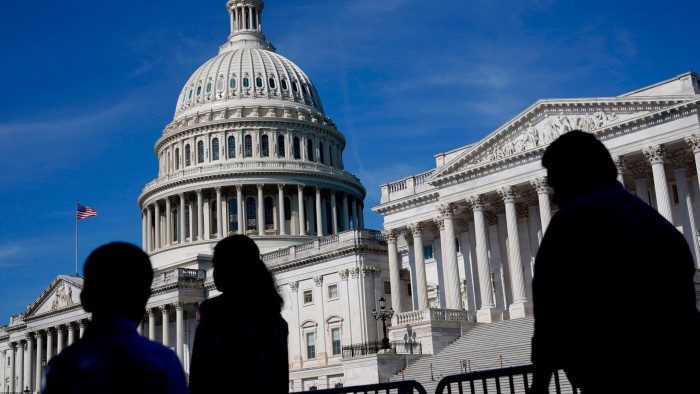Unlock the White House Watch newsletter for free
Your guide to what the 2024 US election means for Washington and the world
Donald Trump has told lawmakers he wants to end the special tax treatment of private equity and hedge fund profits known as “carried interest”, setting up a potential clash with America’s wealthiest financiers.
The push by Trump — in a White House meeting on Thursday with Republican leaders from Capitol Hill — comes as the president intensifies talks over a broader tax cut bill he wants passed this year that is core to his domestic economic agenda.
Karoline Leavitt, the White House press secretary, told reporters that Trump had “laid out” his “tax priorities” to the lawmakers, including measures to “close the carried-interest tax deduction loophole”, eliminate tax breaks for “billionaire sports-team owners” — and deliver on campaign promises such as eliminating income tax on tips.
The special tax treatment for “carried interest” has been the subject of big lobbying fights in Washington for the past two decades, ever since private equity groups and hedge funds became bigger forces on Wall Street, attracting scrutiny from politicians.
It is considered a “loophole” because the profits of private equity and hedge fund managers are taxed at long-term capital rates, which are typically lower than ordinary income rates.
Many Republicans and some Democrats have resisted efforts to clamp down on that preferential treatment, helping the private equity industry maintain the status quo. A previous attempt early in Joe Biden’s presidency failed.
But Trump, who had tried and failed to eliminate the special tax treatment of private equity profits in 2017, has now put it back on the table.
“The battle over carried interest is likely going to be the toughest yet,” said one strategist who works closely with the private equity industry. “Trump wanted it gone in 2017 and was stymied by Congress, but today’s congressional Republicans hardly resemble darlings of high finance and are far more willing to fall in line behind the president.”
Still, Trump’s tax plans are likely to be a boon for Wall Street and corporate America given his goal of extending the sweeping tax cuts on income he passed during his first term. But the inclusion of some more populist provisions will test how Republicans in Congress are drifting away from the business-friendly party they have traditionally been. Some Democrats in Congress were already embracing Trump’s appeal on carried interest.
“Perfect timing. I introduced a bill today to end the carried interest loophole and make Wall Street investors pay their fair share. Glad you agree, @POTUS. Time to get this done,” said Tammy Baldwin, a Democratic senator from Wisconsin, on X, referring to Trump.
The 2017 tax bill narrowed the scope of the benefit for private equity by extending the number of years an investment has to be held before the preferential treatment kicks in from one to three years. One scenario would be a further extension of that timeframe, as an alternative to a complete elimination of the loophole.
The debate over the fate of taxes on private equity profits is opening up after dealmakers entered the new year more immediately focused on the president’s antitrust regulators watering down draconian new merger guidelines, which are set to kick in next week, as well as maintaining the tax deductibility of debt and the broader tax cuts. Industry insiders have long believed efforts to eliminate carried interest taxes would run aground because it could also hit investors such as small-time property buyers.
Drew Maloney, president of the private equity industry’s main lobbying group, the American Investment Council, said the 2017 law had struck the “right balance” on carried interest.
“We encourage the Trump administration and Congress to keep this sound tax policy in place and unleash more long-term investment that supports jobs, workers, small businesses and local communities,” he added.
Read the full article here




